It’s daunting enough to write and direct your first English-language film and have it set in modern day New York as opposed to a world and region with which one is intimately familiar. But then you cast Richard Gere in role which may now finally bring him that all elusive Academy Award, and surround him with the talents of Michael Sheen, Dan Stevens, Steve Buscemi, Charlotte Gainsbourg, Hank Azaria, and Lior Ashkenazi, Israel’s favorite leading man. And on top of that, you then weave a beautiful and indelible tapestry of character study and human nature, filled with relatable characters and situations that center around a lonely, quirky, good-hearted man named Norman Oppenheimer and you call that film NORMAN: THE MODERATE RISE AND TRAGIC FALL OF A NEW YORK FIXER. And finally, you release it into the world for all to see and enjoy. This is exactly what writer/director Joseph Cedar has done and movie-goers are all the better for it. From performance to production, NORMAN is worth its weight in gold.

Norman is what’s known as a “Court Jew” or “fixer.” He knows the right people and can get things done (sometimes). Typically missing the mark and seen by many as more of an annoyance than an asset, the tables turn when Norman befriends Micha Eshel, the Deputy Prime Minister of Israel, buying him a $1200 pair of shoes. Several years later when Eshel is elected Prime Minister, he remembers Norman and his kindness, catapulting Norman into the levels of adoration and glad-handing he had never known. But as we all know, the higher one climbs, the harder they fall.
I last spoke with Joseph Cedar telephonically several years ago when we discussed his film “Footnote”, a 2012 Academy Award nominee for Best Foreign Language Film. Set in the world of academia and Talmudic studies with a father and son at opposite ends of the spectrum, “Footnote” is a poignant, witty and well crafted film that employs exemplary cinematography and visual metaphoric reference set to a score that soars with lyricism and emotion, set the tone for the non-Hebrew speaking audience while showcasing the fun and foibles of the human condition, all to a richly textured and satisfying result. Cedar maintains that level of excellence and cinematic construct now with NORMAN.
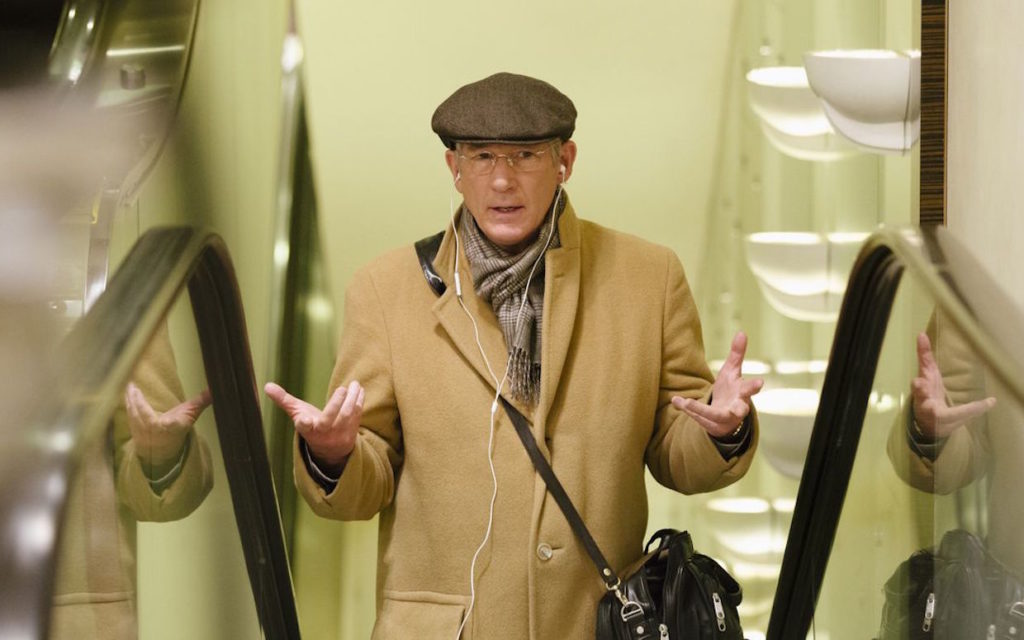
On finally meeting face-to-face, I find Joseph Cedar charming, with a humility and tinge of shyness that is warm and refreshing. As we sit down to talk about everything NORMAN, including the rigors and joy of doing a press tour when Richard Gere is your leading man, the mood is light, starting off on a humorous note as Cedar acknowledges the experience as being “[H]arder than it seems! I wasn’t aware of how difficult it was to talk all day. [laughing]” Although experienced in doing press, “It’s different with Richard. It’s many more [interviews] and it’s different. But it’s good. That’s why a movie star is a movie star. People are interested.”
Interested is an understatement as one look at NORMAN, and one is swept into his world, thanks in large part to the work of cinematographer Yaron Scharf. Having collaborated previously on “Footnote”, Cedar and Scharf are a well-oiled machine. Using cinematography as a storytelling tool, the two make great use of focal point and zoom, but also parallel split-screen designs a la Ross Hunter but which here are melded as one as opposed to visible scene splitting. The result is mesmerizing and flawless. “We tried to design the sets so that Norman is invading someone else’s space. Each one of those compositions is ultimately that it’s Norman finding a way into someone else’s world uninvited. The phone allows him to do that.” Key is that Cedar and Scharf “storyboarded each one of those frames. There was no other way to do it. It either requires set design that allows for two things to be shot at once, or it requires shooting half of the scene taking into consideration what the other half will look like. So it had to be very carefully planned.”
As we talk about specific scenes, Cedar’s face lights up. “It’s funny. Most things that you work on and really spend a lot of energy and sometimes money on the details go unnoticed. And that’s the way it should be; a film has its plot and that’s the center. But some of these things required such careful thought. I’m glad someone sees the work! I always feel bad for the special effects designers in big action movies because if the movie’s working you’re following this amazing ride that is constructed of thousands and thousands of shots that are really complicated to do. And you only know how complicated they are once you see how something that isn’t that complicated is actually complicated! So I feel bad for the special effects people who are kind of taken for granted when a movie works.”
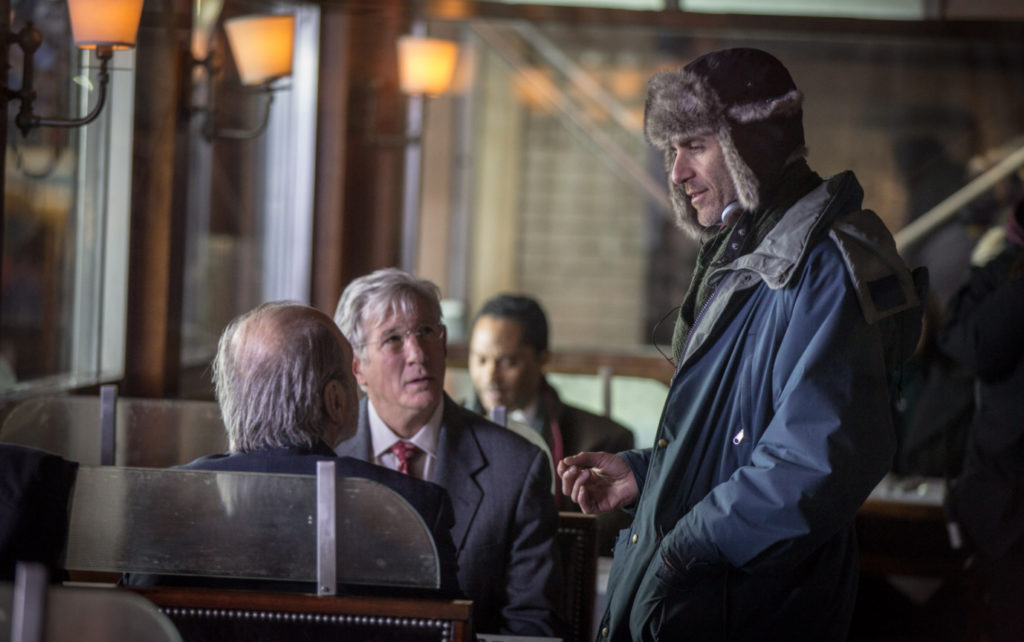
But without a story and engaging characters, NORMAN wouldn’t exist. Cedar excels at character development and interpersonal relationships, especially when set within the Jewish heritage. No detail is too small which just makes the film even more interesting. The story of NORMAN is something inherent to Cedar’s culture and heritage. “I’m attracted to certain elements and certain kinds of characters. It’s so difficult to get a movie off the ground and it requires a commitment that has to be grounded in real fascination with the material. . .[E]verything I have dealt with had to stand that test and whether I could spend a few years examining something and feeling fulfilled by ultimately being able to share some of those observations and insights with an audience.”
Cedar readily admits, “It was hard for me to write this story. I spent more time on this script than on others. It’s hard. Every screenplay has it’s challenges. This was the first screenplay I wrote in English and the first story I wrote outside of where I grew up. It was hard for me to put something together and it was hard for me to feel confident about it even after it already existed. I found myself re-working it even after I would have in Israel already sent it out.”
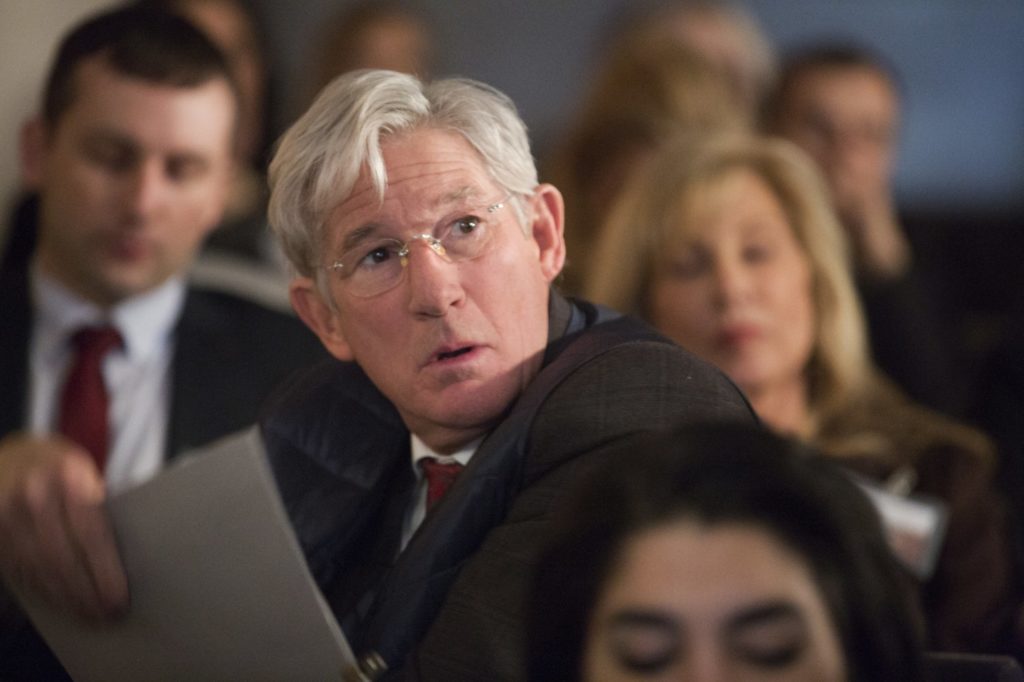
However, although there is a script on paper with characters full fleshed out, it was working with Richard Gere that really brought the character of NORMAN to life. “Norman is extremely familiar to me. I know Normans and I sometimes feel like I’m a Norman. But until you have to discuss a scene or a way of thinking with an actor who has to embody that on screen you don’t really fully understand anything.” Working with Gere over a period of a couple of months before shooting began, “forced me to understand Norman’s operating system. What he does. Why he does it. Not only why he does what he does in a specific scene, but why he needs to be a part of other people’s affairs, which is what most people are aggravated by or resent or are deterred. It’s actually a survival thing for him. It comes out of his loneliness. So understanding that is what happened with my conversations with Richard and it ended up shaping this character a little differently than how I first understood him. Richard asked questions that forced me to sometimes re-write a scene and sometimes just find an explanation that I otherwise wouldn’t have thought I needed to explain why a certain action was happening.”
Of course, this leads to the big question. What led Cedar to Richard Gere for the role of NORMAN? With the six degrees of separation theory coming in to play, one of the NORMAN producers, Oren Moverman, who had previously worked with Gere in last year’s “Time Out of Mind” in which Gere gave a tour de force performance, made the introduction. As Cedar tells it, “Richard made this movie possible. His agreeing to be NORMAN got the financing going. Of course, I was extremely happy that he wanted to be NORMAN.”
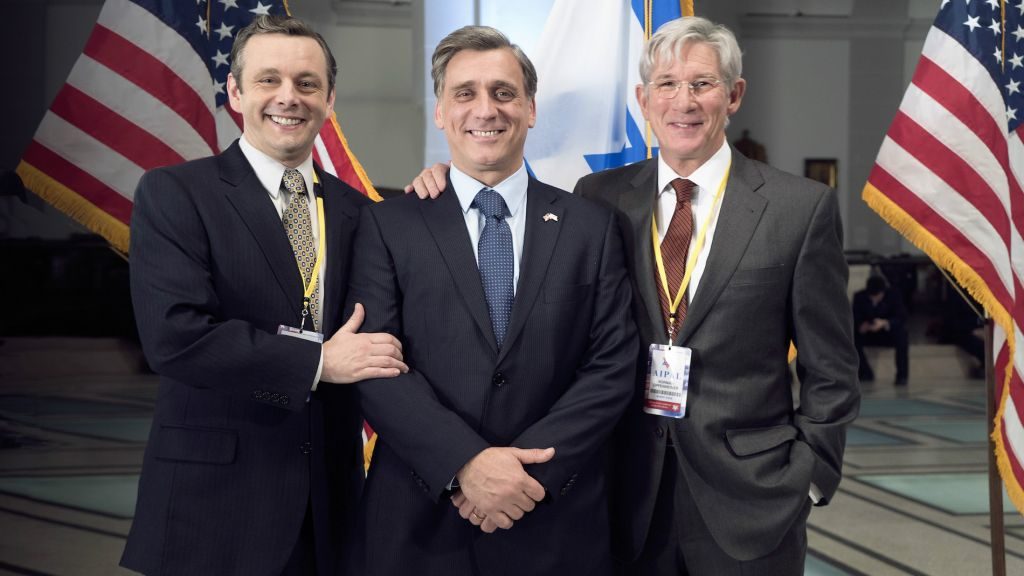
With Gere on board, “Together we found the challenges that were interesting to him and fascinating to me to see how Richard Gere can do something that most people think is the exact opposite of who he is. It’s so different than anything I had seen him do before. That in itself was a challenge that I was excited about. Richard is a great actor. Every actor at the end has the roles that he was offered or he generated. There’s a lot of luck in an actor’s career and not all actors get the chances that they deserve. Some actors have tremendous skill but they’re never offered the role. This is a role that is very different than anything Richard has done before. It’s as if he was taking out this set of tools, years of experience and understanding of what he can do, and then a character that he’s never worked with, created a great experience on the set.”
Going toe-to-toe with Gere’s NORMAN for much of the film is Lior Ashkenazi as Micha Eshel. Written specifically for Ashkenazi, who starred in Cedar’s “Footnote”, “Lior is as close as Israel has to a classic leading man. He’s an average Israeli, but a little bit better, or a little bit more charismatic or maybe a lot more charismatic. He’s a muse for me. I love thinking of what would be a great role for him to play.” As a Deputy Prime Minister to Israel and then Prime Minister, the role is perfect for Ashkenazi who, like Gere, gets to play, shape and mold the character as life, circumstance and politics change.
As the film progresses and we learn more about NORMAN, one becomes increasingly aware of his constantly juggling a multiplicity of balls, something which keeps the audience on its toes wondering if, when and how the juggling act will end. With so many of these balls in the air and their interweaving within the story construct, one has to wonder if Cedar ever thought about cutting back on Norman’s juggling act. As Cedar analyzes the character, it becomes clear the answer to that question is no, at least not consciously.
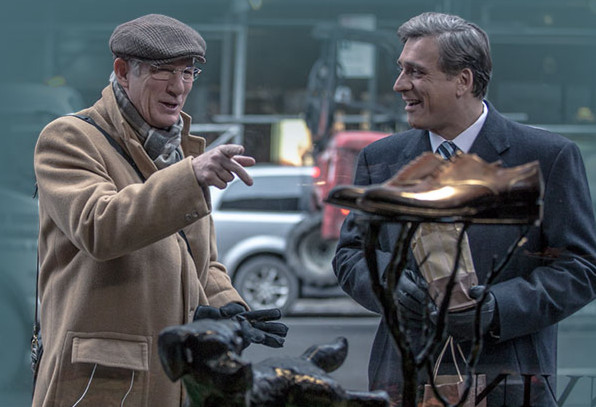
“I think that’s Norman’s way of ‘keeping his head above water’, as he says. If someone is just doing one thing and that thing fails then he has nothing. Since Norman is failing with most of what he’s doing he needs at least eight different things for him to at least suspend the acknowledgment of failure enough to try something else. So having all those balls in the air is his technique. Still water is death. If the water is moving something is happening. And that’s Norman’s notion. As long as I can keep things going, if I can mix things up, even it complicates things to an unnecessary degree, as long as there’s some reason why people are either angry at me or need me or something, then I’m alive. Some people walk next to a complicated situation and say ‘I don’t want to deal with that.’ Norman sees a complicated situation and goes, ‘Alright! This is exactly what I need. This is where I may be needed, because there’s a complicated situation.’ It’s like a lawyer doesn’t have any function when there’s no conflict. Norman doesn’t have a function when everything is simple. He’s looking for the complications.” But what kind of complications does a character like NORMAN give Cedar as a screenwriter?
“After a screenplay is written everything seems to feel organic. You read a screenplay and say, okay. One scene leads to the next to the next and it all makes sense. And if a story is good, you never ask yourself were there other options or were there story ideas that led nowhere. But the process of writing has many story ideas that lead nowhere. At the end, if everything comes together it’s because I tried about 50 different other story ideas that led me to nothing, to dead ends. The result feels like it crystallized and everything has a purpose in the story, but that’s not where it is in the process. In the process, every scene seems like it’s another problem that needs to be solved. And if it’s a good scene then you don’t know what the solution is. There’s nothing in this particular project that was obvious. Everything had to be invented in a way that didn’t fit any kind of template.”
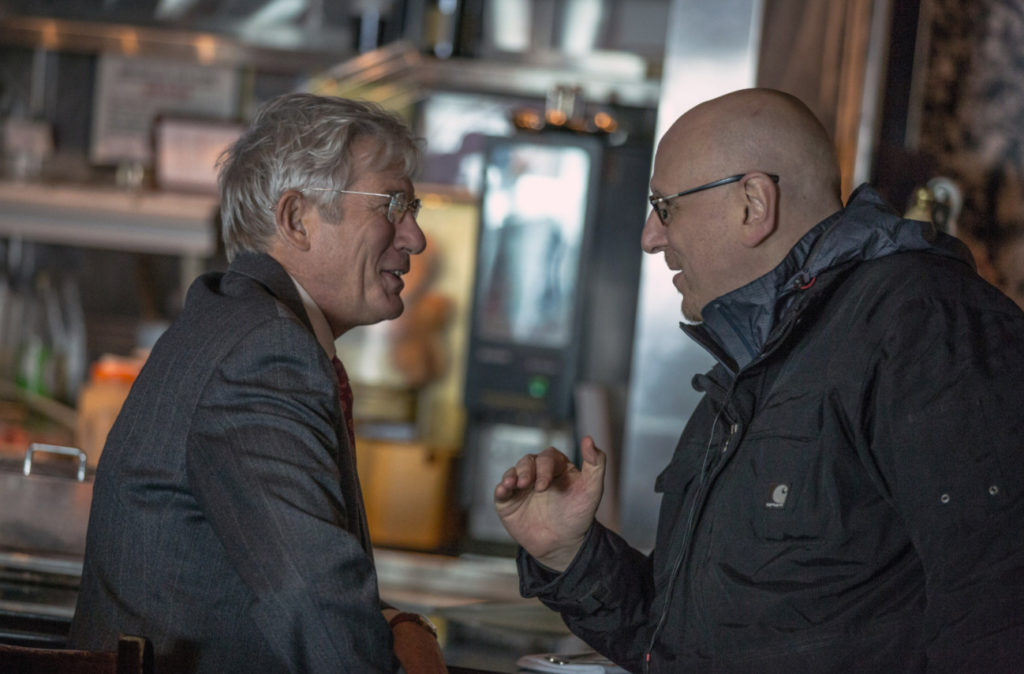
Often overlooked by many is the film’s score. Not so with NORMAN. The music speaks volumes with a bit of whimsy that somewhat mirrors Norman’s antics but it’s also steeped in the sounds of traditional Jewish folkloric music. Composed by the Japanese composer Jun Miyake, even Cedar is surprised that he has a Japanese composer writing music for a film and character with strong Jewish roots. “He was introduced to me because we edited with a guide-track that Kurt Weill Composed with ‘Threepenny Opera’ and we were looking for a contemporary Kurt Weill; someone who has the ability to create pathos or a size of sound like Kurt Weill, and at the same time have this wink of ‘I’m not taking myself too seriously’. You always feel that there’s something humorous about it even though it is emotional or dramatic. This is Jun’s style, that’s what he does. I think he found a way to touch Norman’s soul even though there’s nothing culturally that he identified. He came from a Japanese sensibility and he gave Norman a Jewish tune which is remarkable to realize. There is something that is universal about Norman’s soul. It’s not really that culturally specific. The world he’s in is specific. But the soul, his motivations, can be channeled by a Japanese composer.”
Excited that he was able to pull out more of his directorial tools and elevate his own game working with talents like Gere, Ashkenazi, Sheen, Scharf and Miyake, Cedar is enthusiastic in his praises for the team. “Everyone I worked with on this film was really good at what they did. That is definitely true about the cast. I was lucky enough to work with not only excellent actors, but actors in the point of their career where they’re doing their best work. I felt extremely lucky about it and that was extremely exciting. I came to set everyday knowing that what will happen will be better than what’s on the page.”
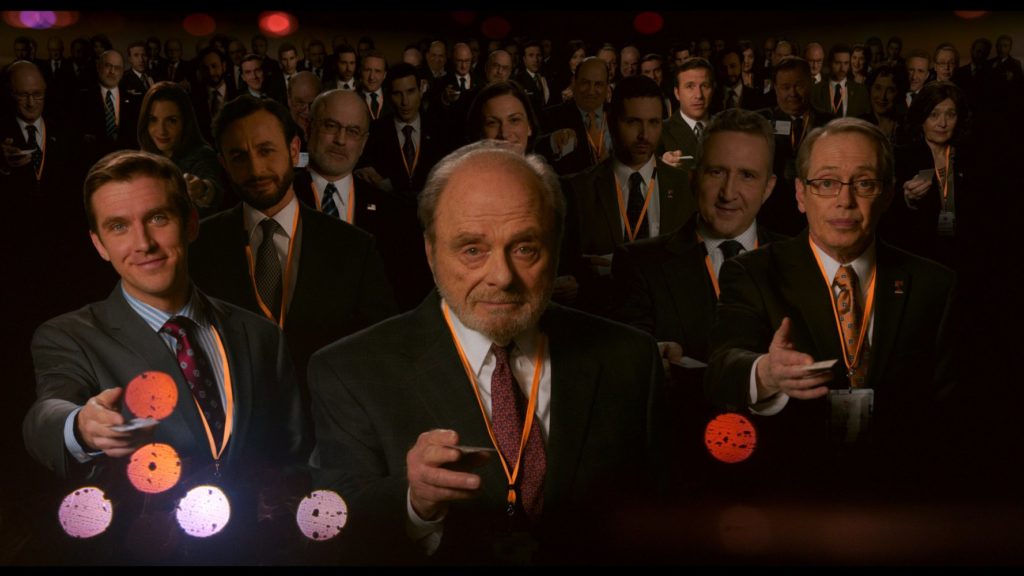
Joseph Cedar shows us that NORMAN transcends any one culture or any one person. There is a universality in NORMAN. And as Cedar himself now says, “Normans are vital to so many things. . . Embrace the Norman in you!”












